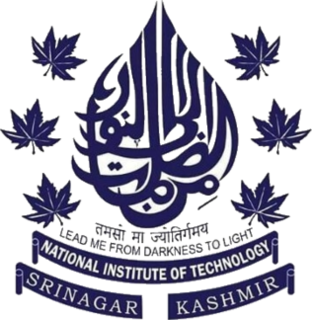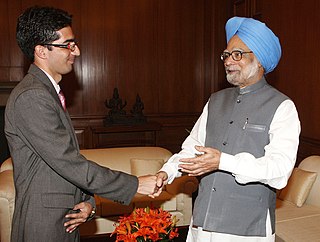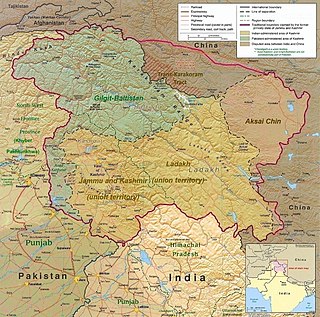
Srinagar, is the largest city and the summer capital of Jammu and Kashmir. It lies in the Kashmir Valley on the banks of the Jhelum River, a tributary of the Indus, and Dal and Anchar lakes. The city is known for its natural environment, gardens, waterfronts and houseboats. It is also known for traditional Kashmiri handicrafts like Kashmir shawls and also dried fruits. It is the northernmost city of India to have over one million people, the 32nd most populous city in the country, and the second largest city located in the Himalayas, after Kathmandu.

Mehbooba Mufti is an Indian politician of the Jammu and Kashmir Peoples Democratic Party (PDP), who served as the last Chief Minister of Jammu and Kashmir as a State, from 4 April 2016 to 19 June 2018. After the revocation of the special status (autonomy) of the state in August 2019, Mufti was detained without any charges at first and later under the Jammu and Kashmir Public Safety Act. She was released only in October 2020, after the Supreme Court of India quizzed the government about the length of her detention.

The National Institutes of Technology (NITs) are the premier autonomous public technical universities under the jurisdiction of Ministry of Education, Government of India. They are governed by the National Institutes of Technology, Science Education and Research Act, 2007, which declared them as institutions of national importance and lays down their powers, duties, and framework for governance. The act lists thirty-one NITs. Each NIT is autonomous, linked to the others through a common council known as the Council of NITSER, which oversees their administration and all NITs are funded by the Government of India.

Syed Ali Shah Geelani was an Islamist, pro-Pakistani separatist leader in Jammu and Kashmir, regarded as the father of the Kashmiri jihad. He was a member of Jamaat-e-Islami Kashmir between 1953 and 1993, and regarded as one of its top leaders. He left Jamaat in 2004 and founded Tehreek-e-Hurriyat, a key constituent of the All Parties Hurriyat Conference (APHC), a conglomeration of separatist parties in Kashmir. Geelani served as the Chairman of the Hurriyat Conference until he quit the group in June 2020. Geelani was also a three-time Member of the Legislative Assembly from the Sopore constituency, elected on a Jamaat-e-Islami ticket in 1972, 1977 and in 1987.
Joint Entrance Examination – Main (JEE-Main), formerly All India Engineering Entrance Examination (AIEEE), is an all India standardised computer-based test for admission to various technical undergraduate programs in engineering, architecture, and planning across India. The exam is conducted by the National Testing Agency (NTA). Admission for B.Tech, B.Arch programs in the premier technical institutes such as the National Institutes of Technology and Indian Institutes of Information Technology are based on the rank secured in the JEE-Main. Since 2021, the test is being conducted 4 times every year, spanning from January to May.

National Institute of Technology Srinagar is a public technical university located in Srinagar, Jammu and Kashmir, India. It is one of the 31 National Institutes of Technology (NITs) and as such is directly under the control of the Ministry of Education (MoE). It was established in 1960 as one of several Regional Engineering Colleges established as part of the Second Five Year Plan (1956–61) by the Government of India. It is governed by the National Institutes of Technology Act, 2007 which has declared it as Institute of National Importance.

The 2006 Indian anti-reservation protests were a series of protests that took place in India in 2006 in opposition to the decision of the Union Government of India, led by the Indian National Congress-headed multiparty coalition United Progressive Alliance, to implement reservations for the Other Backward Classes (OBCs) in central and private institutes of higher education. These protests were one of the two major protests against the Indian reservation system, the other one being the 1990 anti-Mandal protests.
Asiya Andrabi is a Kashmiri and founding leader of Dukhtaran-e-Millat. This group is part of the separatist organisation 'All Parties Hurriyat Conference' in the Kashmir valley and the Government of India has declared it as a "banned organization". The main aim of the organisation is to work for the freedom of Kashmir from India.
On 26 May 2008, the government of India and the state Government of Jammu and Kashmir reached an agreement to transfer 99 acres (0.40 km2) of forest land to the Shri Amarnathji Shrine Board (SASB) in the main Kashmir valley to set up temporary shelters and facilities for Hindu pilgrims. This caused a controversy, with demonstrations from the Kashmir valley against the land transfer and protests from the Jammu region supporting it. The largest demonstration saw more than 500,000 protesters at a single rally, among the largest in Kashmir's history.

Lal Chowk is a city square in Srinagar, Jammu and Kashmir, India.

Shah Faesal is a former Indian politician and bureaucrat from Jammu and Kashmir. In 2010, he became the first Kashmiri to place first in the Indian Civil Services Examination. He resigned from the Indian bureaucracy in protest on 9 January 2019, citing "unabated killings" in Kashmir among other things.

National Institute of Technology Uttarakhand is a public technical university in the Indian state of Uttarakhand. It was founded in 2009, as one of the 10 new National Institutes of Technology in India, and is recognised as an Institute of National Importance. It admitted its first batch of students in 2010-11.
India has the largest numbers of engineers as well as the largest number of engineering education institutes and infrastructure in the world. As of 2021, India annually produces one million engineering graduates. India's technical education infrastructure includes 3500 engineering colleges, 3400 polytechnics and 200 schools of planning and architecture.

In September 2014, the Kashmir region suffered disastrous floods across many of its districts caused by torrential rainfall. The Indian state of Jammu and Kashmir, as well as the Pakistani administered territories of Azad Kashmir, Gilgit-Baltistan and the province of Punjab were affected by these floods. By 24 September 2014, nearly 277 people in India and about 280 people in Pakistan had died due to the floods.

The Exodus of Kashmiri Hindus, also known as the Exodus of Kashmiri Pandits, refers to the emigration of Hindus out of the Kashmir Valley.
Masarat Alam Bhat is a Kashmiri separatist leader and chairman of the Jammu Kashmir Muslim League and also serving as chairman of the Hurriyat Conference, the umbrella organization of the separatists in Kashmir. He was appointed as chairman of Hurriyat Conference after the death of Syed Ali Shah Geelani. He played a significant role in the 2010 Kashmir stone pelting rallies which broke out against the Machil encounter carried out by the Indian Army in Kashmir. Government has booked Masrat Alam in 27 criminal cases but in most of these he has either been exonerated or bailed out by the courts and was released after Mufti Mohammad Sayeed took over as the Chief Minister of Jammu and Kashmir on 1 March 2015. He was detained under the controversial Public Safety Act and was in March 2015 released which caused a major political controversy and dominated Indian Parliament Proceedings. Amid speculations over his release Masrat Aalam said that no deal was made between him and the Chief Minister Mufti Mohammad Sayeed, saying "I spent more than four years in prison and during all these years I challenged the grounds of my 'illegal' detention". He has been Jailed for 17 years and has around 27 cases against him.

Shehla Rashid Shora is an Indian human rights student activist who has pursued her Ph.D. at Jawaharlal Nehru University. She was vice-president of the Jawaharlal Nehru University Students' Union (JNUSU) in 2015–16 and was a member of the All India Students Association (AISA). She rose to prominence whilst leading the student agitation calling for the release of Kanhaiya Kumar, Umar Khalid and others who were arrested on charges of sedition in February 2016 for participating and organizing sloganeering in JNU.

The 2016–2017 unrest in Kashmir, also known as the Burhan aftermath, refers to a series of violent protests in the Kashmir Valley and subsequently Chenab valley, Poonch district and Rajouri district of Northern Jammu division in the Indian state of Jammu and Kashmir. It started with the killing of Burhan Wani, a commander of the Kashmir-based Islamic militant organisation Hizbul Mujahideen, by Indian security forces on 8 July 2016. After his killing, anti-Indian protests started in all 10 districts of the Kashmir Valley. Protesters defied curfew with attacks on security forces and public properties.

Stone pelting in Kashmir refers to stone throwing by Kashmiri Muslims on the Indian forces and Jammu and Kashmir Police deployed for crowd control in Jammu and Kashmir to express their anger. In the local language, it is termed as "Kanni Jung", which means fighting with stones and the stone pelters are called as Sangbaaz or Pathraw Player. However in the recent past the number of stone pelting has dropped significantly.

National Institute of Technology Tiruchirappalli is a public technical and research university near the city of Tiruchirappalli in Tamil Nadu, India. It was founded as Regional Engineering College Tiruchirappalli in 1964 by the Governments of India and Tamil Nadu under the affiliation of the University of Madras. The college was granted Deemed University status in 2003 with the approval of the University Grants Commission, All India Council for Technical Education and Government of India and renamed as National Institute of Technology Tiruchirappalli. The university was declared as an Institute of National Importance in 2007 by the Government of India under the National Institutes of Technology, Science Education and Research Act and is one of the members of the National Institutes of Technology (NITs) system, a group of premier Indian technical universities governed by the Council of NITSER.













